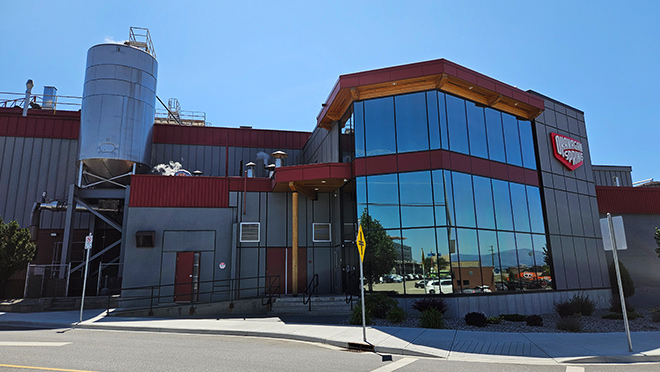Okanagan Spring is brewing up demand response savings

Shift your usage and increase your savings
If you've taken a look at our revised feasibility study and custom project incentive programs recently, you'll have noticed that they both support industrial and large commercial customers with the following types of projects:
- Energy efficiency
- Low-carbon electrification
- Demand-response
Many customers are more familiar with energy efficiency and low-carbon electrification, so let's explore demand response for businesses and then see how it's helping the Okanagan Spring Brewery in Vernon find new ways to save.
"If you participate in our demand response for business program, you can earn monetary rewards for shifting electricity during periods of peak demand," says Kevin Gray, a Key Account Manager (KAM) with BC Hydro.
"By helping us to reduce load on the busiest parts of our system, our electrical grid can operate more efficiently and reduce the need for expensive new infrastructure."
Demand-response events are short periods of high demand on our system. If you can shift at least 5% of your typical electricity use to before or after the event, you'll earn $50 per average kilowatt (kW) demand reduction over the course of the season's events. The more you reduce or shift, the more you can earn.
"Each event lasts up to four hours and there can be up to 20 events per season," says Kevin. "We’ll give you 12 hours' notice before each one so that you can plan when and how you shift or reduce your energy use."
Okanagan Spring is already seeing the benefits
Okanagan Spring in Vernon is one of our customers already seeing the potential in demand response. Chris Dougherty, Senior Project Manager, Engineering started talking to Kevin about demand response last fall and was skeptical at first: "At the time, I thought was it was going to be a hard sell, telling the production facility to consider shutting down or modifying production schedules to minimize power use on site."
"But once we looked into it, we realized that we didn’t actually have a great understanding of how we identify, measure, or monitor demand on site. And that opened up a door to something we'd never really considered before. For example, when our systems like refrigeration all ramp up at the same time, we see a spike of 200-300 kW above the preceding baseline period. Since then, electrical peak demand has been an energy team priority for 2024."
As soon as Okanagan Spring participated in some demand-response events, Chris' team started to see what might be possible. "For our first event, we saw a 55% reduction in peak power consumption, and we realized that each demand-response event is an ROI [return on investment] opportunity, where prioritizing or adjusting our production processes and schedules to shave our peaks might be outweighed by the rewards we get back. We've now got benchmarking and KPIs [key performance indicators] in place to help monitor our progress."
Demand response has already helped Chris' team identify two project opportunities for long-term savings:
- Refrigeration system optimization: An ongoing study to increase the efficient operation of all refrigeration systems; readjusting setpoints and control strategies.
- Air compressor and dryer upgrade: This fall, the brewery will install new equipment to provide a 25% reduction in annual air compressor and air dryer electrical consumption, saving an estimated 99,000 kilowatt-hours (kWh) per year once implemented.
Demand response is just part of Okanagan Spring's wider energy efficiency initiatives. As an alumni of our strategic energy management cohort program, they have a nine-person energy team across all departments and have developed an opportunity register, performing a technical analysis of energy conservation measures. In 2023, these measures yielded an 8.9% plant-wide electrical power reduction – or around 432,000 kWh per year in savings.
The brewery also took part in our compressed air leaks campaign, with 76 leaks and 10 improvements reported, yielding a reduction of 45,000 kWh per year. And since 2016, the team has also completed two major lighting retrofit projects, a waste heat recovery ambient glycol vaporizer initiative and a plant-wide audit.
Future projects considered for feasibility and potential implementation include rooftop solar, battery storage, boiler electrification, building envelope upgrades, steam trap monitors, and as a result of demand response, utility sub-metering. "Once approved, sub meters can provide the benefit of plant demand-side management of our electric and gas utilities," says Chris.
"Demand response really has allowed us to take a deep dive into understanding how this affects financials, how we use energy on site, and how it impacts consumption and demand charges. It's substantial, and I encourage people to keep an open mind about the concept as you might be surprised by the results."
Could your business benefit from demand response?
Is your business eligible to participate in demand-response events? Here's what we look for:
- Your business must be on our medium general service (MGS), large general service (LGS) rate or have a designated BC Hydro Key Account Manager.
- Your business must have operated at your current address for at least one year.
- You'll need at least one dedicated person on staff who will receive and respond to events.
- You can't use more of a carbon-intensive energy source (e.g., gas or diesel) as a way to reduce your BC Hydro electricity use.
To find out more about demand response for business, contact your Key Account Manager or Regional Energy Manager, or call 604 522 4713 in the Lower Mainland or 1 866 522 4713 elsewhere in B.C.